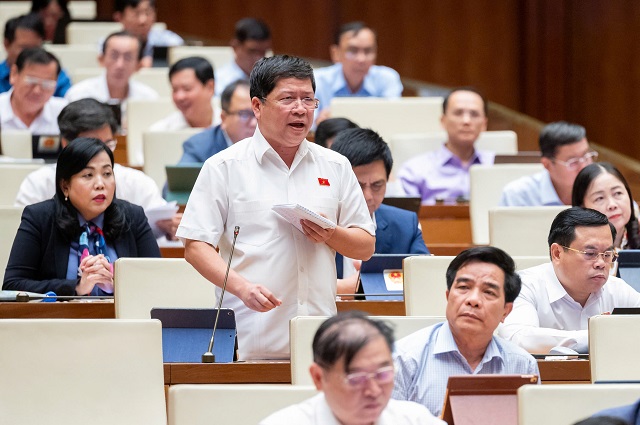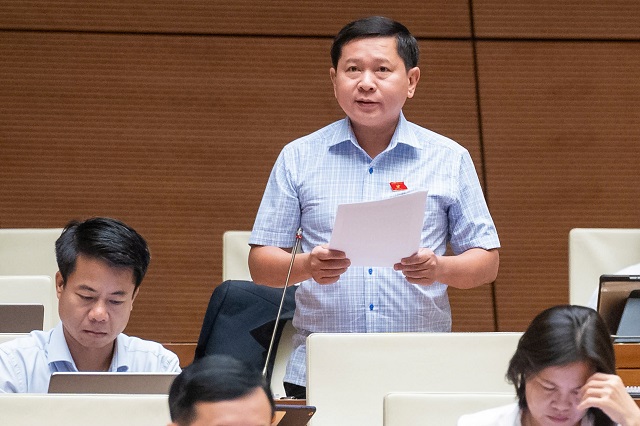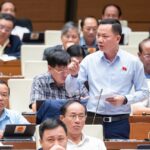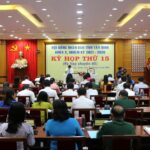One solution to cool down the real estate market is real estate bonds.
Deputy Ta Van Ha from the Quang Nam Province’s National Assembly delegation pointed out the reality of the real estate market’s sudden and steep price increases. Besides institutional and policy obstacles, the deputy suggested that there are signs of manipulation and price gouging by a group with vested interests, creating a real estate bubble.
 Deputy Ta Van Ha from the Quang Nam Province’s National Assembly delegation speaks at the meeting
|
The deputy suggested that we need to closely and accurately assess the issue and provide specific and fundamental solutions. While the draft resolution has identified limitations, they are mostly related to policies and laws. However, there are still abnormal factors, with prices suddenly doubling or tripling, which is inconsistent with the general situation and the people’s needs.
According to the deputy, one solution to reduce real estate market prices is real estate bonds. Currently, real estate bonds are issued with an interest rate of 12-15%, plus about 3% issuance fee. Therefore, the goal of issuing real estate bonds carries a significant burden when the debts in this field come to maturity. If we don’t tightly control the recovery and development of the real estate market, issuing bonds will be ineffective. Moreover, with such high-interest rates, the three-year timeframe can easily create a burden for the State and the people, leading to an increased risk of bad debts and even bankruptcy.
Therefore, the real estate market will not cool down soon, and people will not have the opportunity to access it. Hence, the deputy proposed studying solutions and conducting inspections to re-evaluate the fundamentals to restore and develop a healthy and correctly oriented real estate market.
There is a need to increase the supply of rental housing for low-income earners.
According to Deputy Hoang Van Cuong from the Hanoi National Assembly delegation, the abnormal increase in real estate prices is due to a high number of buyers purchasing property for accumulation, causing a large amount of money to flow into real estate instead of business and production. In addition, the real estate supply is becoming scarce, and market forces such as brokers and auctioneers are deliberately driving up prices to maximize profits.
To control real estate prices, Deputy Hoang Van Cuong proposed the following: Require participants in auctions to prove their financial capability to purchase the property, eliminating those who bid only to resell. Immediately implement Article 31 of the Price Law on checking the elements forming the price when there are abnormal fluctuations and requiring enterprises to declare the selling price for the first time on the secondary market. In addition, establish a mechanism to manage professional real estate trading floors in some major cities to ensure transparent market operations.
Regarding social housing development, Deputy Hoang Van Cuong stated that low-income earners often cannot afford to buy a house or even pay bank interest. The deputy suggested increasing the supply of rental housing for low-income earners, allowing them to rent for life and switch to buying commercial housing when they can afford it.
Studying the form of social housing built by individuals for rent
Deputy Ta Minh Tam from the Tien Giang Province’s National Assembly delegation expressed concern about the situation where many targets for social housing development in the National Housing Strategy by 2020, with a vision towards 2030, have not been achieved. The supply of social housing is limited, the selling prices are high, and the conditions for people to access policies are complicated. The average income of the people is still low compared to the ability to pay for housing.

Deputy Ta Minh Tam from the Tien Giang Province’s National Assembly delegation speaks at the meeting
|
Through the implementation of the three forms of social housing development stipulated in the 2014 Housing Law, it was found that most social housing projects are invested and built with enterprise capital and cooperative capital. Some localities have also allocated state capital, including budget capital and non-budget state capital, for social housing development. Regarding the form of social housing development with individual capital, in the period from 2015 to 2023, there was no such type, mainly developing boarding houses with a large number. Enterprises in industrial zones have not paid attention to this issue.
The deputy recommended promptly taking synchronous solutions to overcome the subjective causes leading to the existing shortcomings and limitations. It is necessary to study solutions to promote the implementation of the form of social housing built by individuals for rent. Pay attention to measures to promote, support, transform and upgrade the construction of boarding houses for workers, especially the existing boarding areas that are currently meeting the accommodation needs of a large number of workers but are assessed by competent agencies as not meeting construction standards and not ensuring safety and living conditions.
In addition, it is necessary to strengthen the control of selling prices and buying prices of social housing that is invested and built without using public investment capital and public financial capital, and strictly control the quality of social housing.
“Addressing the Soaring Property Prices: A Proposal to Tax Vacant Properties”
The Parliamentary Supervision Delegation recommends expediting the completion of research and proposing amendments and supplements to the tax laws. This includes the enactment of new legislation that introduces higher tax rates for individuals who occupy large land areas and own multiple residences, as well as for those who fail to utilize their land promptly or leave it abandoned.
“A Focused Approach: Targeting the Affordable Housing Market of $2.5 Billion and Below”
In the National Assembly session on October 28, a representative suggested that the government should focus on the affordable housing segment, specifically properties valued at 2.5 billion VND and below. This targeted approach would prevent the government from spreading its resources too thin. However, it is crucial to streamline the processes and avoid a bureaucratic maze when implementing social housing support policies.
The Ultimate Investment: Tay Ninh’s Multi-Billion Dong Project
The Tay Ninh Provincial People’s Committee has just approved a resolution on investment policies for key projects in the region, with a substantial budget of hundreds of billions of dongs. This decisive move underscores the province’s commitment to fostering economic growth and developing key infrastructure projects.




















